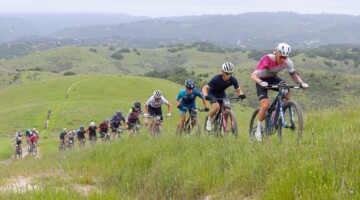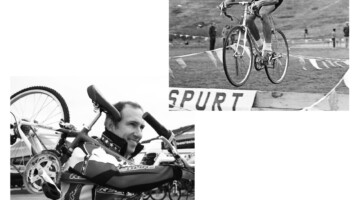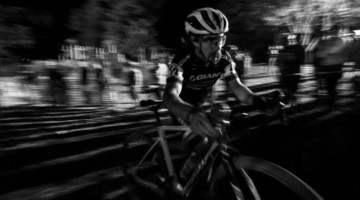Cyclocross season is in full swing, and if you’re anything like us, your race schedule and your off-the-bike responsibilites have you running around at a fever-pitch all week. In this week’s training Tuesday, Ian B. McMahan, NASM and NATA-certified exercise physiologist, goes in-depth on an oft-overlooked aspect of training—recovery.
By Ian B. McMahan
Train a lot, but not too much. Training and racing places a lot of stress on the body, and athletes seeking to maximize endurance performance will ride a fine line between adaption and over-stressing tissue. Recovery is critical to balance the stress of training but recover too much and potential improvements are left on the table.
Adaptation
Training induces adaptations in brain, heart, lungs and muscles and one of the ways you become a faster cyclist is through training harder and longer. Both of these aspects of training are correlated with greater gains and in very basic terms, when the body is overloaded with training, small amounts of damage are created that release chemical signals indicating the need to adapt. Repairing and rebuilding that damage creates a stronger engine.
If you don’t allow your body this repair time, future workouts and ultimately fitness, will suffer. Do that over the course of a cyclocross season, and it should be apparent that a lack of good recovery could lead to injury, burnout or overtraining. Of course, if all of your rides are at a recovery level effort than there isn’t any “stress” for the systems to adapt. Figure out that balance and you’ll finish the season stronger than when you started.
Everyone’s Different—Recovery Depends on Goals

Get your recovery, and training, right and you can be at the top step of the podium. © Matthew Lasala / Cyclocross Magazine
Also important is the fact that the amount of recovery is specific to the individual as each athlete may respond differently to a given training stimulus, and the amount and intensity of training required for improvements may differ from one athlete to another. Similarly, how much recovery is needed will vary by athlete. Some weeks may need an extra recovery/rest day, and self-awareness and monitoring is an important tool to use during a competitive season.
Monitoring training load is an important tool in determining to whether an athlete is adapting to a training program and to minimize the risk of overreaching, injury, and illness. While various analytical tools and assessment tests exist, research has shown that self-perception of effort and fatigue is a valid and easy tool for assessing recovery.
In the push to improve cyclocross performance, modifications in training load are required, particularly increases in frequency, duration, and intensity. Accordingly, training loads should be adjusted at various times during the season to either increase or decrease fatigue. Ensuring that fatigue is adjusted correctly is important for both adaptations to training as well as for competition.
For cyclocross, with its weekly races and maximal efforts, training hard but recovering enough is especially central to success. Like any attribute of a training plan, planning recovery depends on the season’s goals.
Just want to race every week, stay competitive and avoid the heckling that can come along with getting lapped? If that’s the case then weekly training can err on the side of more recovery, with the race serving as a high intensity-training day with a couple other lower intensity rides during the week as base training.
But if your goals include finishing the season strong and peaking for an end of season championship or big race you’ll have to walk the tightrope of less recovery. Training during the week should include some recovery but also the hard, race like efforts that prepare you for the unique stresses of cyclocross.
Use the following to maximize recovery during cyclocross season.
Recovery Do’s

Make sure you get some sleep. Researchers recommend seven to nine hours of shuteye for optimal performance. Photo by Flickr user elias quezada
Sleep – Good sleep equals good recovery and researchers recommend seven to nine hours of shuteye for optimal performance. Too little sleep can lead to cortisol spikes, which can impact training and overall recovery. One night of poor sleep before a race probably doesn’t affect physiology but it can influence perception of effort, making exercise feel harder than it is and reducing performance. Caffeine, which can reduce the perception of effort, can be used before a race to counter poor sleep.
Stanford researchers determined that getting more than eight hours per night per can significantly improve sports-specific performance, indicating that sleep is one of the important strategies for athletes to achieve both mental and physical recovery following exercise.
Eat – Hard efforts deplete muscle glycogen (the fuel for endurance exercise) and need to be replenished, especially on back-to-back racing days. Carbs will restock glycogen and restore performance potential. Generally, eating in the hour after exercise has been shown to maximize replenishment of muscle glycogen. Leading up to a race, 7–12 g of carbohydrate/kg of body mass should be consumed the day before the race.
Hydrate – Noting that pre-exercise body weight loss at or above three percent may decrease subsequent endurance performance, a review article in the journal Nutritional Review recommended, “Endurance athletes should strive to start exercise well hydrated, which can be achieved by keeping thirst sensation low by drinking approximately 5-10 mL/kg body weight of water two hours before exercise.”
Recovery Don’ts

While putting back a couple cold ones seems tempting, alcohol consumption might negatively affect recovery. © Cyclocross Magazine
Alcohol – this might sting a little, but a 2014 review article determined that alcohol consumption might negatively affect recovery. Their recommendation, “If athletes are to consume alcohol after sport/exercise, a dose of approximately 0.5 g/kg body weight is unlikely to impact most aspects of recovery and may therefore be recommended if alcohol is to be consumed during this period.”
Anti-Inflammation – Generally a little inflammation is good. Noted endurance researcher Dr. Asker Jeukendrup, a noted exercise scientist, recently noted, “Removing the signals of stress will also reduce the signals needed to adapt. In other words, a little soreness is OK. Icing or using Advil immediately after exercise may interrupt the signal to your body to adapt. Before a race, when short-term recovery is a priority, the benefit of these anti-inflammatory measures may outweigh a potential downside.
Mental Fatigue – multiple studies have shown that mental fatigue can influence performance and recovery. A 2015 review article in the journal Frontiers of Physiology noted, “Mental fatigue has an obvious detrimental effect on physical performance however no research has focused on recovery from such effects. Recovery strategies targeting changes in mood, feelings of fatigue, and perceived exertion would therefore no doubt assist in complete athlete recovery.”
Want to learn more about cyclocross training or technique? Take a look at our training & skills archives for information about how to be a better ‘cross racer!




























